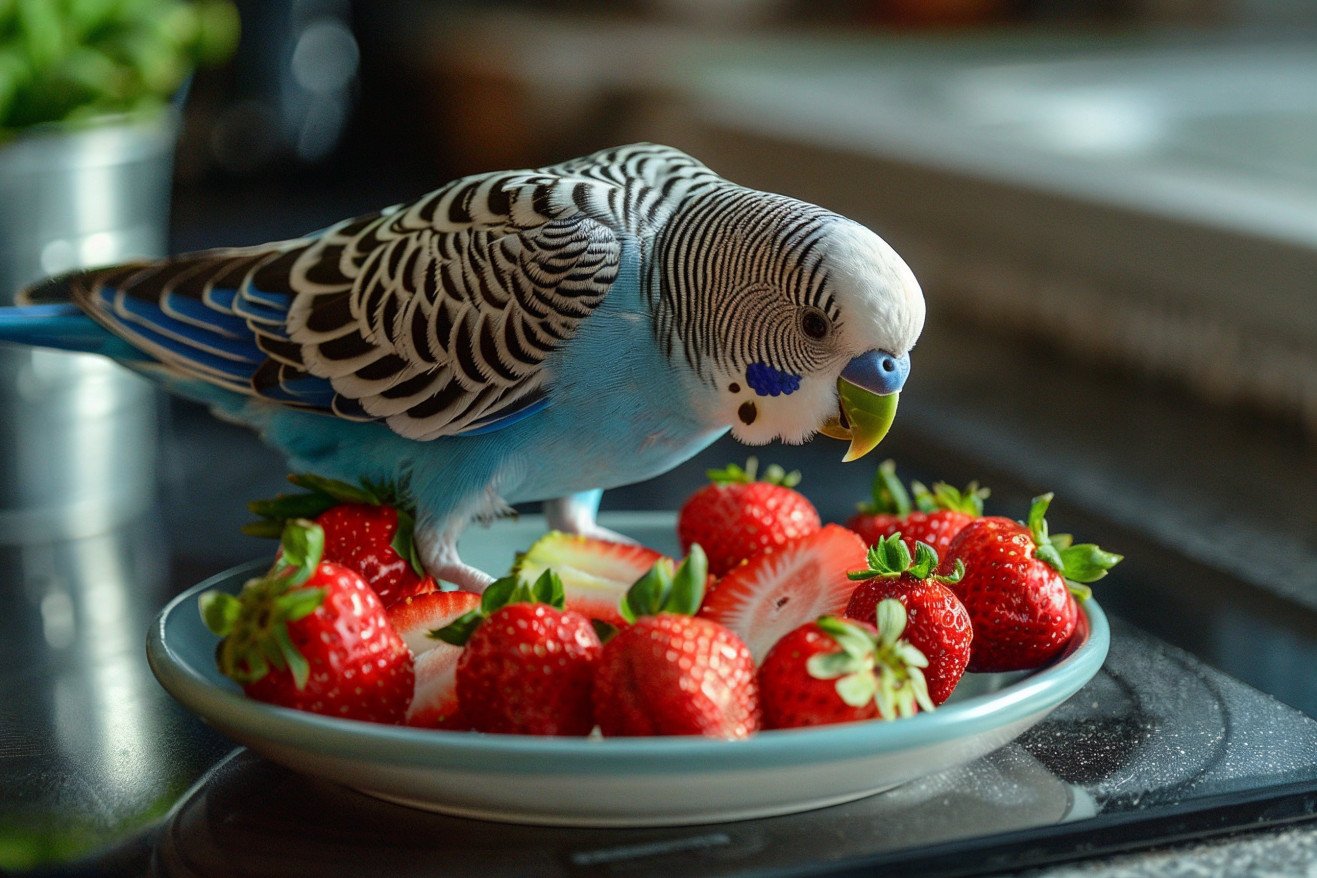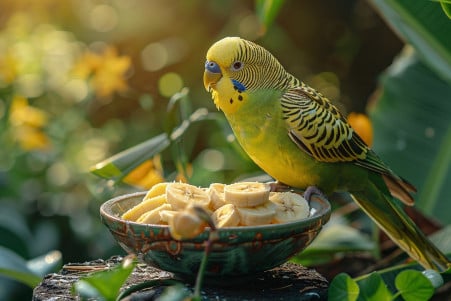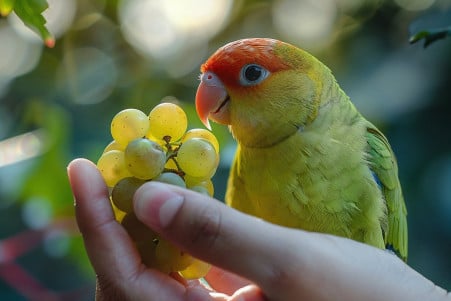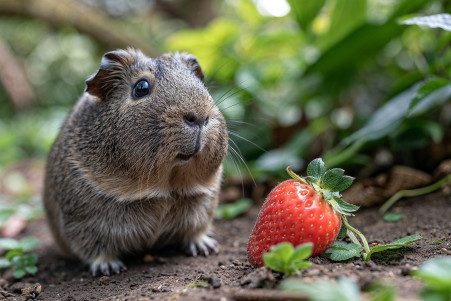Can Parakeets Have Strawberries? A Complete Guide
16 May 2024 • Updated 14 May 2024

Strawberries are sweet, colorful, and delicious, so it's only natural to wonder if your pet parakeet can enjoy them too. The good news is that parakeets can have strawberries, but there are some important things to keep in mind before you start feeding them to your bird. Parakeets can have strawberries in moderation as a treat. Strawberries do have some nutritional value, including vitamin C, antioxidants, and fiber. However, they are high in sugar, so they should be a small part of a parakeet's balanced diet that is primarily made up of seeds and pellets.
In this article, we'll cover what avian vets, nutritionists, and parakeet enthusiasts have to say about the pros and cons of feeding strawberries to your parakeet. From case studies to dietary guidelines, we'll cover portion control, how to prepare strawberries, and which birds may need to skip this fruit due to their specific dietary needs. By the end, you'll have everything you need to know to confidently add this colorful fruit to your parakeet's diet.
Can parakeets eat strawberries?
What Do Parakeets Eat in the Wild?
Parakeets, also known as budgerigars, are native to the grasslands of Australia, where they have adapted to eat a variety of foods in the wild. VCA Animal Hospitals explains that wild budgies eat a range of seeds, fruits, berries, and vegetation that changes with the seasons while living and foraging on or near the ground.
In captivity, pet parakeets need a diet that includes a variety of the foods they would eat in the wild. While seeds are a part of this diet, a diet that only includes seeds doesn't meet all of a parakeet's nutritional needs, according to the avian experts at Bird Supplies.
In addition to high-quality seed mixes and pellets, which should make up the bulk of a parakeet's diet, the diet should also include fresh vegetables, herbs, and a small amount of fruit, such as strawberries, according to PetHelpful. This mix of foods will help ensure that your bird gets all of the essential vitamins, minerals, protein, and other nutrients it needs to stay healthy and strong.
Safe Fruits and Vegetables for Parakeets
Parakeets can enjoy a number of different fresh fruits, such as strawberries, bananas, melons, and berries. VCA Animal Hospitals notes that these fruits are high in carbohydrates, vitamins, and minerals and are brightly colored. However, avocados, tomatoes, and citrus fruits are not recommended because they can be poisonous or cause digestive problems for parakeets.
In addition to fruits, PetHelpful suggests that parakeets can be given vegetables like broccoli, carrots, and leafy greens, all of which are safe and nutritious. Fruits should make up no more than 10% of a parakeet's diet, while vegetables can be up to 20%, according to Animal Bliss.
Parakeets can benefit from the nutrients in fruits and vegetables if they're given a balanced diet that includes a variety of produce. The important thing is to make sure they're getting the right amount and that they're not eating too much of any one thing.
How to Switch to a Healthier Diet
Parakeets can be very stubborn when it comes to trying new foods, especially if they have been eating a seed diet for a long time. Bird Tricks Store explains that the best way to get them to eat healthier foods like chopped veggies, cooked grains, and mashed fruits is to slowly introduce them while still giving them their seed in the evening.
It's important to keep an eye on your bird's weight, behavior, and droppings during this time. Talk Budgies Forums also notes that some birds won't eat fruits and veggies unless they have a little bit of seed mixed in at first. It will take time and patience to get your bird to a point where they will eat a healthier, more balanced diet.
Meal Times and Serving Sizes
Parakeets should be fed twice a day, with the main meals in the morning and evening. The Parakeet Feeding Guide from Omlet US, suggests that seed should be available all day but limited to 1.5-2 teaspoons per bird. Fruits and vegetables should be offered in separate dishes and replaced daily.
The Budgie Feeding Guide from Northern Parrots suggests that pellets or formulated diets should make up the majority of a parakeet's diet, at 60-80%. This will ensure that the birds get the right nutrients at the right times of day. Consistency in meal times and portion sizes is important for maintaining good health and wellness.
Following these recommendations will allow you to give your parakeet a diet that's rich in nutrients and variety while still making sure that they get everything that they need. Keeping an eye on their consumption and making changes as needed will help you make sure that they're getting everything that they need from their new, balanced diet.
Malnutrition and Dietary Deficiencies
Malnutrition in parakeets can manifest as poor feather quality, overgrown nails/beak, and a weakened immune system, according to Malnutrition in Parrots and What to Do About it. Meanwhile, some of the most common dietary deficiencies in parakeets include protein, calcium, magnesium, and various vitamins. For example, according to The Signs of Malnutrition In Birds And What To Do About It, a lack of vitamin A can cause dry, scaly skin and dull feathers, while a lack of vitamin D can lead to respiratory issues.
To catch potential nutritional issues early, weigh your parakeet on a regular basis and look for changes in their droppings and behavior. If you suspect malnutrition, you may need to treat it by giving your parakeet supplements and gradually switching them to a more balanced diet, according to avian veterinarians. However, with the help of a vet and the right dietary changes, you can make sure your bird is getting the nutrients they need to be healthy.
Conclusion: Offering a Varied and Nutritious Diet
When part of a balanced diet, strawberries can be a nutritious snack for parakeets. VCA Animal Hospitals notes that fruits like strawberries should account for no more than 20-25% of a parakeet's daily diet, which should also include seeds, pellets, and vegetables.
Bird Supplies also notes that a healthy diet for parakeets should be based on high-quality pellets and supplemented with a variety of fresh, organic vegetables, herbs, and a small amount of fruit. This kind of balanced diet will ensure that parakeets get all the essential vitamins, minerals, and nutrients they need.
Animal Bliss explains that fruit should account for 5-10% of a parakeet's diet, while vegetables can make up to 20%. However, the most important thing is to introduce new foods slowly and watch portion sizes closely to ensure that the bird can successfully transition to a balanced diet.
By making sure that malnutrition is addressed and that parakeets are enriched by their diet, you can make sure that your bird is as healthy and happy as possible.


